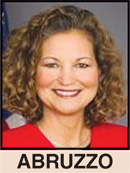NLRB General Counsel Abruzzo declares college athletes can organize
By Mark Gruenberg
PAI Staff Writer
Washington (PAI) — Citing changed conditions which put the lie to colleges’ claims that football and basketball players are “student-athletes,” National Labor Relations Board General Counsel Jennifer Abruzzo has told agency officials those athletes at private colleges and universities are “employees” who can organize and bargain collectively.
 And not only their colleges would have to respond, she said. The ruling body of college sports, the National Collegiate Athletic Association (NCAA) could in some cases be a “joint employer” with the university or college, equally responsible for obeying or breaking Labor law in dealing with the players, Abruzzo warned in a footnote late in her nine-page Sept. 29 memo.
And not only their colleges would have to respond, she said. The ruling body of college sports, the National Collegiate Athletic Association (NCAA) could in some cases be a “joint employer” with the university or college, equally responsible for obeying or breaking Labor law in dealing with the players, Abruzzo warned in a footnote late in her nine-page Sept. 29 memo.
The issue is important because the players, most of them workers of color, are severely exploited, while college administrators and coaches, who are overwhelmingly white, profit from the players’ performances on the football field and the basketball court.
While players receive “stipends” to cover their tuition, room and board, the colleges and their coaches control virtually every facet of their time on campus, and can also decide whether to cut –– fire –– them, making the schools and coaches effectively employers.
TRYING FOR YEARS TO UNIONIZE
College athletes have been trying off and on for years to unionize, with an organizing drive several years ago by the Steelworkers among football players at a top private university in Los Angeles being the first shot.
More recently, football players at Northwestern University in the Chicago suburb of Evanston, Ill., voted to unionize, and NLRB Chicago Regional Director Peter Sung Ohr had ruled for them. Key issues were not the stipends, but complete control coaches and administrators have over players’ class schedules, course selection, practice times, interaction with other students and—most importantly—treatment of and compensation for injuries.
Northwestern and the National Collegiate Athletic Association (NCAA) appealed that ruling by Ohr, now Abruzzo’s deputy, to the full NLRB during a GOP majority’s reign. It ducked the case. But in her memo, Abruzzo said that board left the ultimate unionization issue open.
Since then, there’s been further erosion of the student-athlete myth. Abruzzo cited football and basketball players organizing on their own to speak out for the Black Lives Matter movement and against coaches’ demands they come to practice and play on campuses despite the coronavirus pandemic — which forced those institutions to bar regular students.
EMPLOYER RETRIBUTION
There’s also been employer retribution against players who spoke out, Abruzzo reported. Other bosses fire pro-union workers during and after organizing drives. She cited a September 2021 lawsuit filed by a Washington State University football player whose coach had cut him “for his support of the #WeAreUnited Movement.”
“The concern about retaliation is very real,” Abruzzo noted.
But Abruzzo particularly cited a unanimous U.S. Supreme Court ruling that college athletes have the right to organize, hire agents, and bargain with corporate sponsors to get paid for use of their “names, images and likenesses” on shoes, jerseys and other memorabilia.
‘FREEDOM TO ENGAGE’
“The freedom to engage in far-reaching and lucrative business enterprises makes players at academic institutions much more similar to professional athletes employed by a team to play a sport, while simultaneously pursuing business ventures to capitalize on their fame and increase their income,” Abruzzo said.
And while concurring in the High Court ruling, Justice Brett Kavanaugh openly said the next step could be to let the athletes unionize, she pointed out.
Kavanaugh “suggested one mechanism by which colleges and students could resolve the difficult questions regarding compensation is by ‘engag[ing] in collective bargaining,’” Abruzzo wrote.
“In NCAA v. Alston, the Supreme Court… recognized college sports is a profit-making enterprise and rejected the NCAA’s antitrust defense based in the notion of amateurism in college athletics,” Abruzzo, a former top counsel for the Communications Workers, explained.
“The court held NCAA rules limiting certain education-related compensation schools may offer athletes, such as rules that limit scholarships for graduate or vocational school, payments for academic tutoring, or paid post-eligibility internships, violate antitrust law,” she said. Though the justices didn’t discuss athletic scholarships and stipends, they “rejected the notion that NCAA compensation restrictions are ‘forevermore’ lawful.”



Leave a Reply